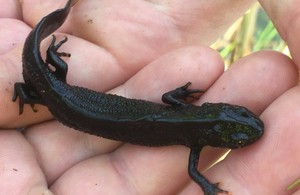New homes for people and wildlife across the North East
Greener building and conserving wildlife goes hand in hand in the North East as a new approach to sustainable development is launched.

Great crested newt. Picture by Jess Welch
Natural England’s district level licensing (DLL) initiative, which better protects great crested newts, while also delivering the Government’s ambitions to build back greener, has been launched in Northumberland, Durham, Tyne & Wear and Tees Valley.
Great crested newts are protected under UK and EU law. It is an offence to disturb the species so developers must apply for a licence before undertaking any building work on or around the places that they live, trapping and relocating the species before starting work.
Seasonal restrictions can lead to delays and create uncertainty over the costs and scheduling of planned development, holding up house building.
District level licensing offers another way. Developers make a conservation payment to join their local DLL scheme, with the sum based on the predicted impact of their development.
The payment covers the creation or restoration of ponds in areas which are known to represent the best places for newts to thrive.
It means a faster and simpler system for developers, and benefits local people and authorities by avoiding costly delays and licensing uncertainty, helping to ensure homes are built and local authorities can deliver on their plans.
Most importantly, the scheme will support better conservation outcomes for our largest species of newt, at a landscape scale, helping local populations to expand and link up across the north east. This new habitat will be monitored and looked after by our local, expert partners for 25 years – all funded by the initial payment.
Homes England’s Burtree Garden Village, near Darlington, will be one of the first much-needed home developments to take advantage of the new DLL scheme. The conservation payment will create more than ten new, safe and secure homes for newts.
Marie Kiddell, Head of Planning and Enabling for North East, Yorkshire and the Humber at Homes England, said:
As a major actor in the housing market, Homes England play a significant role in supporting the housing sector to deliver more sustainable homes and places. We welcome the introduction of the District Level Licencing (DLL) scheme, particularly in relation to our Burtree Garden Village development in Darlington.
DLL removes the need for costly on-site mitigation and constrained delivery programmes whilst creating certainty and improved protection for the species through the provision of strategic, landscape-led, high quality mitigation in offsite locations.
We look forward to working with Natural England on our Burtree Garden Village project and exploring the wider opportunities that the introduction of the DLL scheme may deliver for other potential housing sites in the region.
Mel Hughes, Sustainable Development Programme Director at Natural England said:
District level licensing is transforming red tape regulation into licensing nature’s recovery. The rollout of this scheme in Northumberland, Durham, Tyne & Wear and Tees Valley represents a win-win for both local developers and the future of this iconic species.
DLL is being launched across the eight local authorities in the North East: Northumberland County Council, Northumberland National Park Authority, Durham County Council, Darlington Borough Council, North Tyneside Council, Newcastle City Council, Hartlepool Borough Council and Stockton-on-Tees Borough Council.
Alongside these, Natural England is working in partnership with Northumberland, Durham and Tees Valley Wildlife Trusts to create and maintain habitat for great crested newt which would otherwise be threatened by development.
DLL is now available and already being successfully adopted by developers across England in 130 local authorities, as part of a programme funded by the Ministry for Housing, Communities and Local Government (MHCLG).
Further information
Great crested newts:
- Great crested newts are the UK’s largest species of newt and are characterised by their orange-yellow bellies and a long wavy crest on their body and tail.
- Great crested newts are a European Protected Species. Under the Habitats Directive, it is an offence to capture, kill, injure or disturb them or their habitat without a licence from Natural England. Although rare across Europe, they can be locally abundant in England.
- Despite being protected under UK and EU law, in the last century great crested newts have declined across Europe, mainly as a result of pond loss and deterioration.
District level licensing:
- District level licensing offers an alternative approach whereby developers make a conservation payment based on the predicted impact of their development which covers the creation or restoration of ponds in areas which are known to represent the best places for newts to thrive. New habitat created will be maintained and monitored in perpetuity - all funded by the initial payment.
- Natural England are working with our partners to make this new licensing option available for great crested newts across England.
- DLL is quick, simple and easy, and most importantly focuses conservation effort where it will be of maximum benefit to this iconic species. It will also minimise costs for developers and avoid risk and uncertainty through the planning process.
- Apply to join a district level licensing scheme to manage great crested newt (GCN) populations if you are developing land in certain parts of England.
- Individual site-by-site licences are still available. Since 17 February 2020, there is now a charge for these licences. In areas where there is a district level licensing scheme, joining it will be the quickest option to enable development that affects great crested newts.
About Natural England:
Natural England is the government’s advisor on the natural environment. Established in 2006, our work is focused on enhancing England’s wildlife and landscapes and maximising the benefits they bring to the public.